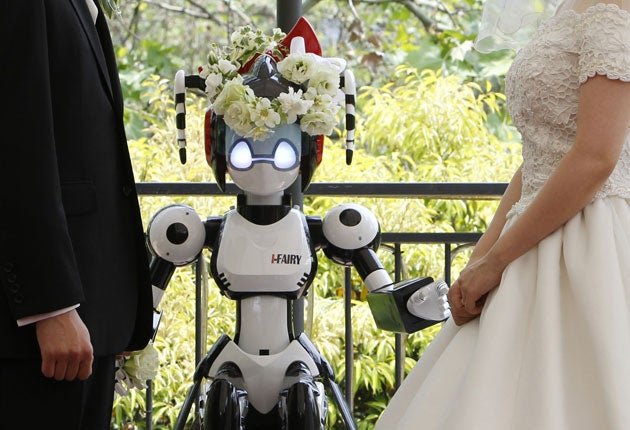Robot conducts first electronic wedding in Japan

Your support helps us to tell the story
From reproductive rights to climate change to Big Tech, The Independent is on the ground when the story is developing. Whether it's investigating the financials of Elon Musk's pro-Trump PAC or producing our latest documentary, 'The A Word', which shines a light on the American women fighting for reproductive rights, we know how important it is to parse out the facts from the messaging.
At such a critical moment in US history, we need reporters on the ground. Your donation allows us to keep sending journalists to speak to both sides of the story.
The Independent is trusted by Americans across the entire political spectrum. And unlike many other quality news outlets, we choose not to lock Americans out of our reporting and analysis with paywalls. We believe quality journalism should be available to everyone, paid for by those who can afford it.
Your support makes all the difference.Flashing eyes, plastic pigtails and a tinny voice are not necessarily what a bride and groom look for in their wedding master of ceremonies, unless they work in Japan's robotic industry.
Tomohiro Shibata and Satoko Inoue tied the knot yesterday under the watchful eye of a 1.5m android known as I-Fairy, in what the machine's manufacturer, Kokoro, said was the first robot-led wedding in the world.
Wires led from the bottom of the robot, bolted to a chair in front of 50 guests at a rooftop restaurant in central Tokyo, to a black curtain a few metres away behind which a man crouched, using a computer to operate the electronic wedding conductor's movement and utterances.
The robot, wearing a wreath of bright flowers and speaking in a tinny voice, waved its arms as it asked the groom to "Please lift the bride's veil", before inviting the newly-weds to kiss.
The happy couple chose this unique angle to their nuptials because they were keen to showcase an example of the new generation of androids. "This was a lot of fun," Satoko Inoue, the 36-year-old bride who works at Kokoro, told the Associated Press. "I think that Japanese have a strong sense that robots are our friends. Those in the robot industry mostly understand this, but people mainly want robots near them that serve some purpose."
Her new husband, 42-year-old Tomohiro Shibata, a professor of robotics at the Japanese Nara Institute of Science and Technology was a little more critical of the feminine android. "It would be nice if the robot was a bit more clever, but she is very good at expressing herself," he said. Japanese manufacturers are increasingly trying to inject robots into everyday life. The University of Tokyo has already developed two baseball-playing robots, Honda has created a child-like android, and a robotic grocery-packer was unveiled in Kyoto last year.
Kokoro, the Japanese firm which manufactures the I-Fairy, also produces humanoid robots which can laugh and smile, products which it hopes will "touch the hearts of the people". The I-Fairy is only one of three in the world and retailing at around 6.3 million yen (£47,000), it may be a while yet before it joins cake and confetti as a regular wedding fixture.
Join our commenting forum
Join thought-provoking conversations, follow other Independent readers and see their replies
Comments